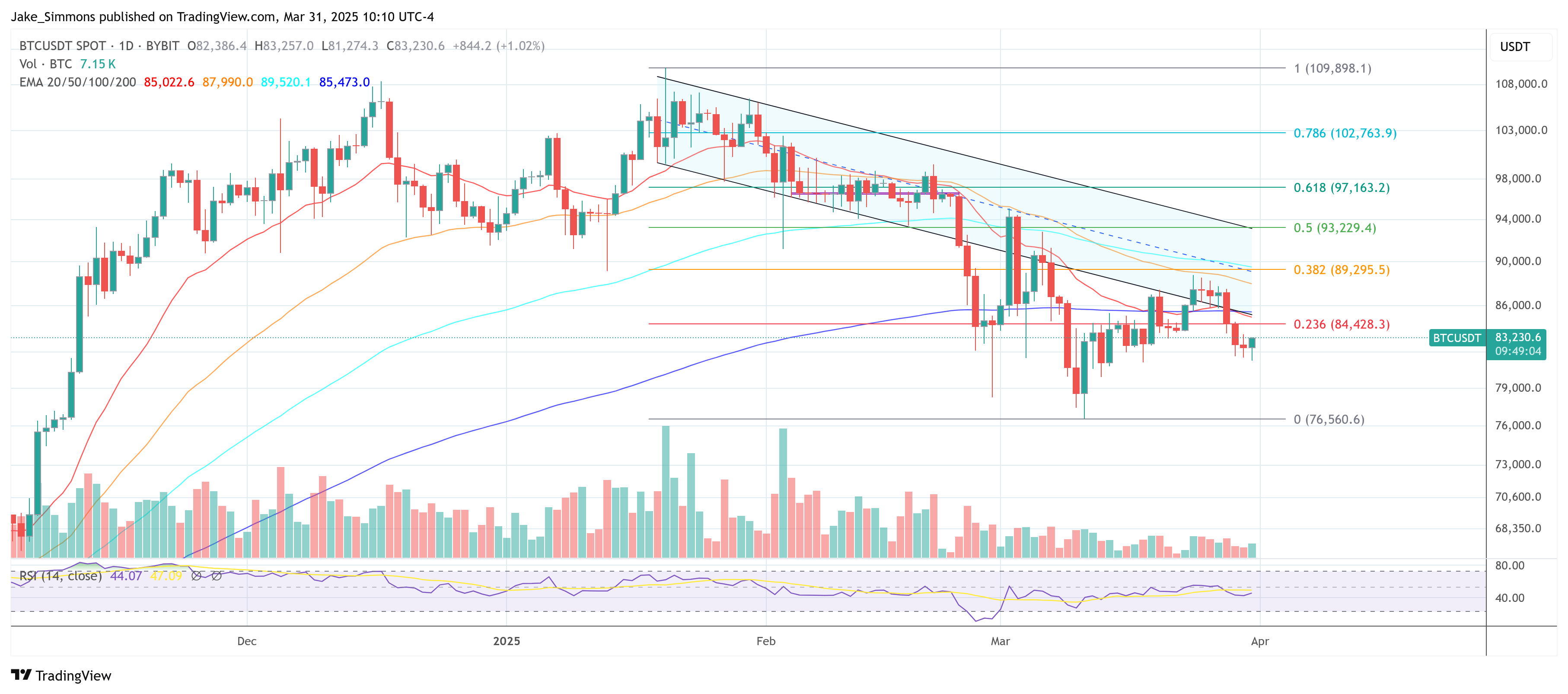Purpose to belief
Strict editorial coverage that focuses on accuracy, relevance, and impartiality
Created by business specialists and meticulously reviewed
The best requirements in reporting and publishing
Strict editorial coverage that focuses on accuracy, relevance, and impartiality
Morbi pretium leo et nisl aliquam mollis. Quisque arcu lorem, ultricies quis pellentesque nec, ullamcorper eu odio.
Este artículo también está disponible en español.
Crypto markets edged decrease Monday following a stark warning from Goldman Sachs, which raised its 12-month US recession likelihood to 35%, citing rising tariffs, weakening progress, and deteriorating sentiment. The reassessment follows the agency’s second upward revision in March to its 2025 US tariff expectations, signaling an more and more fraught macroeconomic surroundings with direct implications for danger belongings — together with cryptocurrencies.
Within the observe titled “US Economics Analyst: A Further Increase in Our Tariff Assumptions”, Goldman economists Alec Phillips, Tim Walker, and David Mericle define their rationale: “We now expect the average US tariff rate to rise 15pp in 2025 […] almost the entire revision reflects a more aggressive assumption for ‘reciprocal’ tariffs.”
Goldman anticipates that President Trump will announce across-the-board reciprocal tariffs averaging 15% on April 2. Adjusted for product and nation exclusions, the efficient rise in common tariffs is predicted to be round 9 proportion factors.
The influence on the macro outlook is stark: Goldman has downgraded its 2025 US GDP progress forecast by 0.5pp to 1.0% (This fall/This fall), lifted its 12 months finish core PCE inflation forecast to three.5% (+0.5pp), and elevated its unemployment projection to 4.5% (+0.3pp). These revisions mirror a stagnating progress surroundings paired with inflationary pressures — a mixture that constrains financial stimulus choices.
The financial institution attributes the rise in recession likelihood to a few key elements: a decrease progress baseline; deteriorating family and enterprise confidence; and “statements from White House officials indicating greater willingness to tolerate near-term economic weakness.”
Regardless of traditionally poor predictive energy from sentiment measures, Goldman writes: “We are less dismissive of the recent decline because economic fundamentals are not as strong as in prior years. Most importantly, real income growth has already slowed sharply and we expect it to average only 1.4% this year.”
Implications For Crypto
Whereas digital belongings have lengthy been seen as uncorrelated to conventional macroeconomic variables, that narrative has advanced. Bitcoin, specifically, has grow to be more and more attentive to broader macro situations — notably liquidity, danger sentiment, and actual yields.
Associated Studying
Because the yield curve inverts as soon as once more — a traditional recession sign — macro analysts are warning of a singular coverage dilemma. As @ecoinometrics famous on X: “The yield curve is inverting again, a traditional recession signal. But unlike past cycles, the Fed is unlikely to rush to QE due to inflation concerns. This creates a double challenge for Bitcoin: potential risk-off pressure without the stimulus relief that typically follows. Bitcoin is very much driven by macro these days. It is behaving like a high-beta play on the NASDAQ 100.”
Nevertheless, not everybody agrees {that a} recession poses a net-negative danger for crypto. In a latest interview, Robbie Mitchnick, World Head of Digital Belongings at BlackRock, supplied a nuanced view of Bitcoin’s macro sensitivity: “Economic fears. I mean, I don’t know if we have a recession or not, but a recession would be a big catalyst for Bitcoin […] It’s catalyzed by more fiscal spending and debt and deficit accumulation. That happens in a recession. It’s catalyzed by lower interest rates and monetary stimulus. That tends to happen in a recession.”
Mitchnick acknowledges the short-term constraints — the wealth impact, diminished disposable revenue, and excessive correlations with equities — however maintains that structurally, Bitcoin advantages from the long-term penalties of recessionary coverage responses. “Bitcoin is long liquidity in the system… and to some extent over just fears of general social disorder […] that too, unfortunately, is something that can come up in a recession.”
He provides that present market reactions might not mirror Bitcoin’s true positioning: “The market has almost, it seems, gotten this in some ways not particularly well calibrated… but that’s where the opportunity comes in for education in a market and an asset class that’s still very nascent.”
At press time, BTC traded at $83,230.

Featured picture from iStock, chart from TradingView.com


